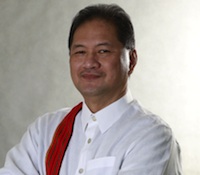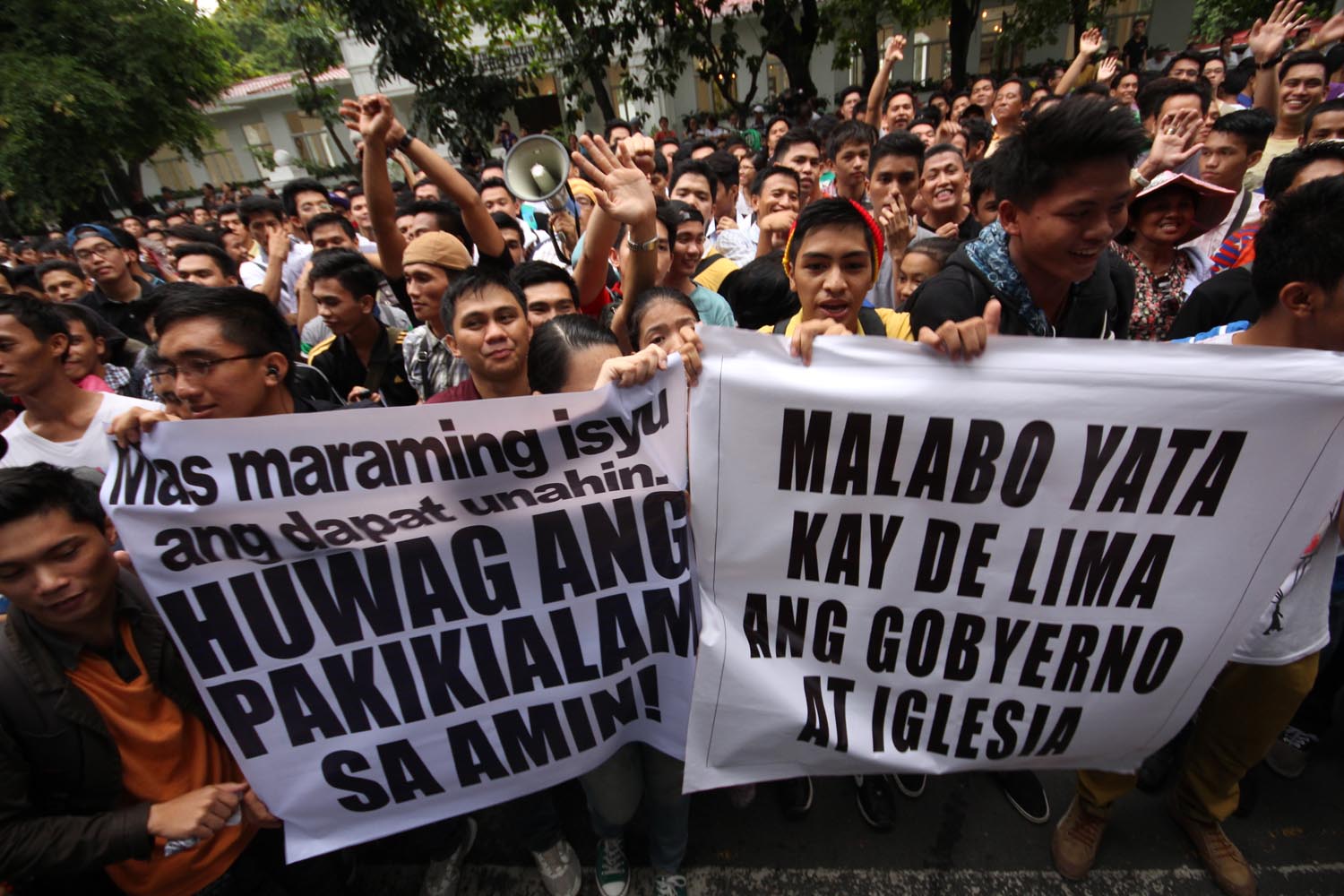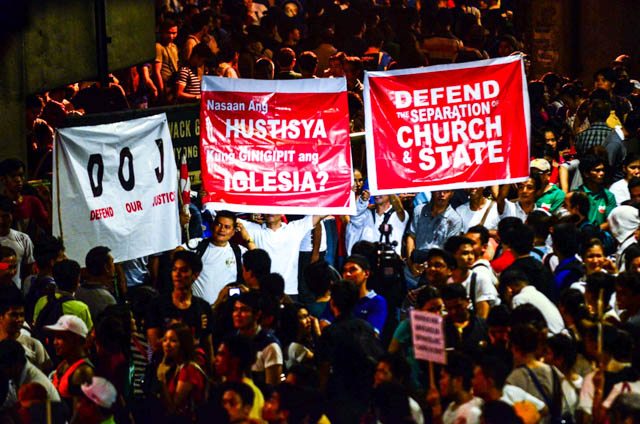 This is what we know so far about the cases filed involving the illegal detention or kidnapping of Iglesia Ni Cristo (INC) ministers allegedly upon orders of its 8-member Sanggunian (Council).
This is what we know so far about the cases filed involving the illegal detention or kidnapping of Iglesia Ni Cristo (INC) ministers allegedly upon orders of its 8-member Sanggunian (Council).
Sometime in July, Sorsogon INC minister Lowell Menorca was arrested and detained on charges of threatening some individuals with a grenade. His brother filed a complaint with the NBI, saying that Menorca and his family was actually being detained under armed guard by the INC and that they feared for their lives.
Late August, Isaias Samson, a member of the INC Sanggunian and head of the INC foreign mission, as well as editor of the official INC publication, also filed a complaint, but this time with the Department of Justice (DOJ). Samson also charged the Sanggunian of illegal detention or kidnapping, when he and his family were also put under armed guard and restricted to their house for several days, while the Sanggunian interrogated Samson about what he knows about the person of the blogger, "Antonio Ebangelista," a pseudonym. Ebangelista has been publicly writing in his blog reports about financial anomalies taking place within the INC.
Under ordinary procedure, the Menorca complaint filed with the NBI would require the investigative agency under the DOJ to issue subpoenas to the respondents in the said complaint. Having been filed last July, it is safe to assume that the NBI should already be issuing, if it has not already issued, such subpoenas to the INC respondents.
On the other hand, also under ordinary procedure, the Samson complaint will require the DOJ to conduct a preliminary investigation to find out whether there is probable cause to file criminal charges of kidnapping against members of the Sanggunian. Kidnapping is a non-bailable offense.
The process of preliminary investigation also requires the DOJ to issue subpoenas to the INC respondents to determine their defenses and thereafter assess whether a criminal case for kidnapping can indeed be filed with the Regional Trial Court of Quezon City, where the crime has allegedly been committed.
So far, the DOJ has only gone so far as to receive Samson’s complaint and record it in its dockets by assigning the complaint a docket number. It has not yet issued subpoenas, much less warrants of arrest, against respondents. The DOJ is not even authorized to issue warrants of arrest. It is the regional trial court that issues warrants of arrest once the criminal charges are filed by the public prosecutors with the Quezon City court.
In the meantime, on the birthday of Secretary of Justice Leila De Lima last August 27, the INC gathered outside the gates of the DOJ demanding that the Secretary refrain from “meddling” in INC matters and respect the separation of church and State. We could only take this to mean that the INC is demanding the DOJ to throw out Samson’s complaint and let matters rest where they are, i.e., within the confines of the INC temples.

Not selective justice
According to the INC, De Lima’s act constitutes selective justice because of the special attention given by the Justice Secretary to the Samson complaint, allegedly even receiving the complaint itself. According to De Lima, there is no truth to this allegation, since it is ministerial upon the DOJ to accept criminal complaints for purposes of conducting preliminary investigation that, in the first place, is the very mandate of the DOJ.
In this instance, De Lima has even no discretion on whether or not to receive the Samson complaint. Receiving a criminal complaint is ministerial upon the DOJ. If the INC demand were to be logically granted, De Lima would have dictated – against all procedure and laws – the state prosecutor to either not accept the complaint or to throw it out. In so doing, she would have committed an act of graft and corrupt practices by unduly favoring a party to the injury of the complainant. What the INC is demanding is for De Lima to commit a crime.
The DOJ performed a ministerial act that cannot otherwise be reversed upon the discretion of De Lima, without her committing a crime under RA 3019 or the Anti-Graft and Corrupt Practices Act. For the performance of this ministerial act, which not even De Lima is authorized to reverse, the INC is asking for her resignation and, obviously, the throwing out of the Samson complaint without the prosecutors even conducting a preliminary investigation on such serious allegations involving a non-bailable criminal offense.
Defiance of state authority
What the INC is therefore saying is that the members of their Sanggunian, not to mention their Executive Minister (who is not even among the respondents), are immune from suit. These 8 people, over and above the 100 million Filipinos, cannot be the subject of criminal complaints or be subpoenaed or required to face a preliminary investigation, much like the President of the Republic.
Extending their reasoning further, they maintain that so long as the matter involves an INC member or an official, the State has no jurisdiction to intervene, even when their member is already claiming and attesting to the commission of criminal acts punishable under Philippine laws.

This worldview is akin only to that of a certain kind of group in our society, that of rebel organizations sworn to the overthrow of established government or their secession from the nation for the purpose of establishing a separate State and national identity.
The similarity starts with the argument that INC ministers and members are subject only to INC jurisdiction, and that State laws do not apply to them. This worldview and the thin line between political secession and the exercise of religious freedom that it traverses is engendered by the practice of a faith that has created such a separate identity from that of Filipino nationhood – so as to exist as a sovereign within itself.
This recent INC adventure into open defiance of State authority can therefore be seen not so much as an exercise of religious freedom, and a demand for the State to respect the separation of church and State, but a continuation of the INC’s history as a reaction to a Spanish-dominated Catholic Church, and its struggle for independence from such foreign domination not only in the aspect of religion, but all social, political, and economic dimensions as well.
This is the expressed worldview. It need not necessarily correspond with the actual reality of the Filipino people consecrating a single identity and nationhood. But then again, what is a nation but an imagined community to which affiliation rests only so far as there is collective consent to belong to it.
INC and the Philippine state
So is the INC defiance actually an issue of separation of church and State and religious freedom, or the resurgence of the underlying historical consciousness of the INC as a separate collective resistant to any form of domination – including that of the State – other than their own self-imposed hierarchy of leadership and belief in exclusive deliverance and salvation?
During the imposition of martial law in 1972, the INC was the last institution to openly resist the Marcos regime even after Congress, media, and the civilian courts were already shut down. The AFP assaulted its compound in Quezon City on September 23, forcibly closing its radio station, with the gunfire and explosion heard in UP Diliman. UP itself was then already shorn of its activists, student organizations, and the community radio that played the Dovie Beam tapes, many of the former having gone underground or having been detained in military camps.
The eventual capitulation of the INC to the Marcos regime exemplifies the dynamism of the religious organization to adapt to political changes in exchange for, at the minimum, religious autonomy, even if at the moment political power and influence is set aside in the face of the consolidation of a new form of State power itself – in this case in the form of a fascist regime. There will always be an opportunity for political reassertion. In the meantime, they have to surrender the political for the survival of the religious, their bloc vote being useless anyway in light of the dictatorship and the indefinite suspension of democratic elections.
The danger therefore in the present situation of the De Lima “intransigence” and non-recognition of INC ascendancy (right after the celebration of their centennial and the inauguration of the symbol of their power and glory, the Philippine Arena complex) is the INC leadership’s certainty that this time it will emerge victorious in this confrontation.
This confidence is brought about by its strategic entrenchment in almost all branches of governance, after its well-played political horse-trading after the end of martial law and the resurrection of patronage politics. In this respect, the INC bloc vote is the singular most important currency that was used to purchase politicians who are only too willing to sell a pound of the government’s flesh, in exchange for their and their family’s political continuity in elective offices. Nobody, including this “tuwid na daan” administration, has been immune from this. Just recently, we have seen how the INC flexed its muscles in the Bureau of Customs, resulting in the unfortunate resignation of a reformist official.
The tentacles of the INC octopus have not spread strong and wide only to be undermined by a mere political upstart who has shown the temerity throughout the Aquino Administration to defy the religious bloc’s demands, first in the case of the dismissal of NBI Director Magtanggol Gatdula, and then in the present controversy.
Asserting political relevance
Leila De Lima is a thorn on the side of the INC not so much because of her intransigence, but of the terrible threat she represents to the INC and its nurtured political power. There can simply be no politician who can say “no” to the INC and still survive the political fall-out, and actually still get elected to national office! She represents not only a devaluation of the INC bloc vote, but worse, the end of the “New Era” we have known and have grown accustomed to. Drunk with power and wealth, the INC leadership cannot allow any diminution of its political influence at this stage of their apotheosis.
The INC's EDSA-Shaw show of defiance is not so much for religious autonomy, as it is for political relevance. Presidential candidates must continue to pay homage at the INC main temple in Commonwealth, and this puny Secretary of Justice cannot be allowed to ruin the great church that the prophet Felix Manalo has built from the ground by showing that public officials can ignore the INC and still occupy powerful government positions.
De Lima must be put in her place, lest political modernization catch up with the INC and the actual separation of the affairs of the State from the Iglesia is finally realized. In its fervent tradition of resistance to State domination, the INC must continue in its goal of dominating the State apparatus, if not the State itself, through client public officials called to do its bidding as payback for their government positions.
No declared or purported presidential candidate has so far dared to express full support for Secretary De Lima. Secretary Mar Roxas’ statement is better than others but that went only so far as a reminder to respect the rights of others. As for me, I do not mind being inconvenienced at all by protests and especially in such a place like EDSA, revered for its role in our democracy. That is not the issue for me in what is happening now.
What I need are for our politicians to say that the rule of law must be followed, its autonomy from politics be respected.
Defeat of INC is good for it and for country
Legally, the disposition of the Menorca and Samson complaints by the NBI and DOJ is an open and shut case. The law and procedure on this, to use recently popularized terms in the Supreme Court, are banal and canonical.
Politically, however, the messianic fortitude and millenarian ascendancy of the INC, and its members’ shared experience as a historically persecuted minority in a predominantly Catholic nation, makes a complex brew for defiance, resistance, and consolidation, in the face of a real or imagined threat of domination by the State, which is actually nothing more than its loss of political relevance and influence, i.e., the genuine separation of the State from the Iglesia.
In short, the INC is threatened not by the violation of the principle of separation of church and State, but its long overdue realization. The now certain victory of De Lima, a result of this controversy, in the senatorial elections will be a manifestation of that actualization.
I know quite a number of INC adherents, including some in government. They are good people. Many have achieved their place in society by their own merits, regardless of the assistance of their church. I will always respect them and hold them in high esteem. We should all do that and reach out to them.
The paradox of all of this is that, if the INC is defeated in this current political battle it has wrongly chosen to wage, it will actually mature, modernize and strengthen itself as a faith community. Nothing will be better for the INC and for our country. – Rappler.com